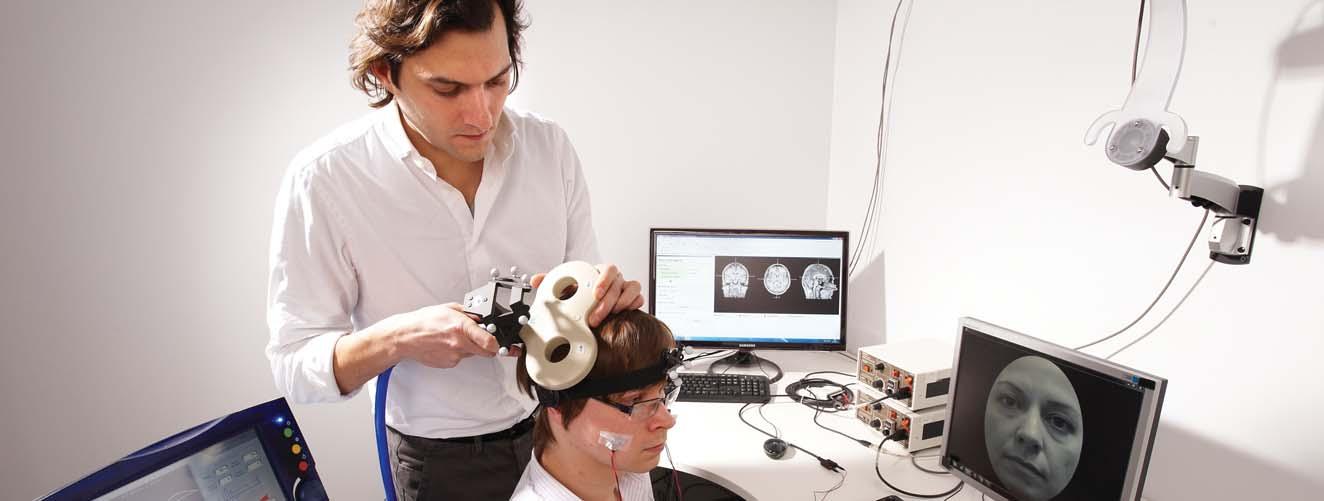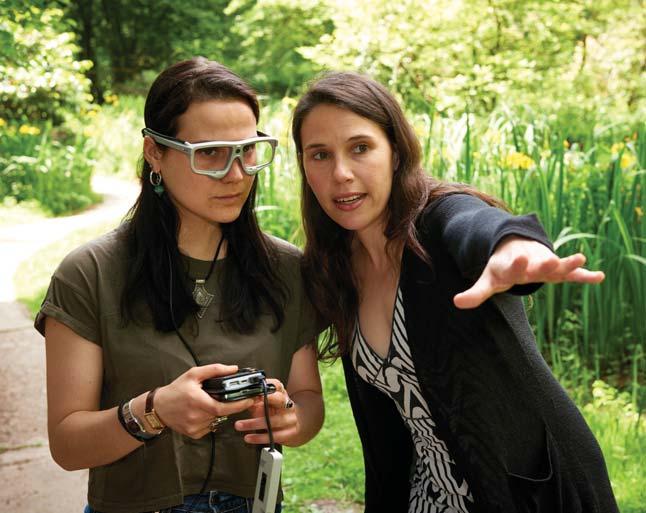
8 minute read
Psychology
“As an aspiring Educational Psychologist, my degree has prepared me with the knowledge and skills I require to apply for the doctorate. The staff here have been so supportive and provided me with incredible volunteering opportunities such as working as a researcher at a centre for children with disabilities.” Emma BSc Psychology
Psychology at Royal Holloway
Advertisement
• Our world-leading research informs our teaching at all levels of our degree courses, giving you the opportunity to learn from researchers at the forefront of the discipline who also are passionate about teaching. In your fi nal year research project, you will work with one of our staff on a topic at the cutting-edge of research. • We consistently score highly in the National Student
Survey. Our students appreciate our dynamic and engaging community, the accessibility of staff and our
Personal Tutor system providing personalised advice and pastoral support throughout your degree. • We have excellent facilities with our own magnetic resonance imaging (MRI) scanner, apparatus to stimulate brain areas (TMS) and for recording electrical changes in the brain (EEG), eye tracking, virtual reality environments, sleep labs, and a baby lab. • All our BSc honours degrees are recognised by the
British Psychological Society as the Graduate Basis for
Chartered Membership.
Emma at the department’s magnetic resonance imaging (MRI) scanner unit
93 % SATISFACTION FROM OUR STUDENTS OVERALL
(National Student Survey, 2020)
13th IN THE UK
( Guardian University Guide, 2021)
Find out more
@RHULPsychology
rhulpsych
RHULPsychology PsyOffi ce@royalholloway.ac.uk royalholloway.ac.uk/psychology
DEGREES
UCAS code Duration International Baccalaureate* A-levels
BSc Psychology BSc Applied Psychology BSc Psychology, Development & Developmental Disorders BSc Psychology, Clinical Psychology & Mental Health C800 3 years 6,6,5 AAA-AAB C804 3 years 6,6,5 AAA-AAB C805 3 years 6,6,5 AAA-AAB C806 3 years 6,6,5 AAA-AAB
BSc Psychology, Clinical & Cognitive Neuroscience C807 3 years 6,6,5 AAA-AAB
MSci Psychology BA Environment and Social Change** BSc Environment and Social Change** JOINT DEGREES BSc Criminology & Psychology*** C801 4 years 6,6,5 AAA-AAB F650 3 years 5,5,5 ABB-BBB F660 3 years 5,5,5 ABB-BBB
CL83 3 years 6,5,5 AAB-ABB
* Required Higher Level grades with a minimum of 32 points overall. ** New interdisciplinary degree under development, see p.80 for more details. *** Work placements are available as part of an optional zero-credits module on single honours degree courses and for CL83 a work placement is off ered as part of a Year in Industry degree (LC38). For Joint degrees other requirements may apply; see other department’s page for full details. We welcome students with a broad range of qualifi cations; see p.130-131.
OPTIONAL PLACEMENT YEAR All undergraduates have the opportunity to apply to take an additional Placement Year, which can be spent studying abroad, working, carrying out voluntary work or a combination of all three. See p.36 for more information.

Your future career
Skills
• Your degree will develop transferable skills that are highly attractive to employers, from advanced literacy and numeracy skills, critical reading, report writing and survey research, to the ability to use statistical methods to assess research fi ndings. • Our degrees are recognised. by the British Psychological
Society.
Opportunities
• Our established connections with many organisations and companies, including the
Macular Society, Southern
Addictions Advisory Service and Acuity Intelligence
Ltd, provide rewarding placement opportunities. • We have a strong graduate network and you will benefi t from the skills and experiences of alumni, careers seminars and advice.
Destinations
• Psychology graduates are well placed for excellent employability in many fi elds. Our degrees also prepare you to progress to postgraduate study. • Our graduates employers include market research companies like Ipsos Mori, heath psychology, forensics, local government, schools and universities, mental health charities, media and consultancies.
Top25
in the UK for Graduate Prospects
(Times and Sunday Times Good University Guide, 2021)
BSc Psychology
C800 You will gain a thorough understanding of how research into human behaviour can be conducted across diff erent core areas of psychology, without limiting study to any specifi c area. During year three you can choose from a wide range of advanced options, covering all the major areas of psychology.
Example modules
• How to be a Psychologist • Understanding perception and cognition • Personality and individual diff erences • Criminal and forensic psychology • Psychology of brain injury
Key features
• Study the most up-to-date and exciting fi ndings in psychology. • Learn with internationally recognised experts in their fi elds. • Develop psychological research skills and practice how to think critically about research. • Benefi t from the department’s advanced research facilities. • Customise your degree in your fi nal year, selecting from a number of optional modules.
BSc Applied Psychology
C804 Focus on applying psychological research to real world issues, exploring a broader social and occupational context. Learn how we can modify health and social behaviour, psychological problems, and how psychology can be used in the workplace, in education and when exploring criminal behaviour.
Example modules
• Understanding mental health and wellbeing • Criminal and forensic psychology • Social psychology in the real world • Educational psychology • Human performance: working with technology
Key features
• Apply the theory and principles of psychology to real-world issues. • Understand a broader spectrum of social and occupational contexts. • Select from a range of optional modules in your fi nal year. • Contribute to cutting-edge research with a fi nal year research project. • Graduate with excellent employability prospects in a variety of sectors.
C805 Focus on issues related to the study of typical and atypical child development and development through the life span, including the development of cognitive and social skills in infancy and early childhood, and developmental disorders such as autism, Down’s syndrome, dyslexia and attention defi cit hyperactivity disorder.
Example modules
• Understanding development across the lifespan • Personality and individual diff erences • Advanced developmental psychology • Language, communication and thought • Health psychology and wellbeing
C806 Focus on the study of psychological problems in children and adults, as well as the study of how psychological factors are related to physical health and the prevention of illness. In your fi nal year you’ll specialise in the study of a range of approaches to clinical mental health issues.
Example modules
• Understanding individuals and groups • Psychological research methods and analysis • Understanding mental health and wellbeing • Developmental disorders • Clinical and cognitive neuroscience
Key features
• Specialise in your fi nal year in the study of human developmental processes and how they may be disrupted. • Contribute to cutting-edge research with a fi nal year research project. • Learn with internationally recognised experts in their fi elds. • Dedicated baby lab for studying the development of infants.
Key features
• Explore specialisms in the areas of clinical psychology and mental health. • Examine the range of approaches to clinical mental health issues. • Benefi t from the department’s advanced facilities, including an on-site MRI scanner. • Contribute to topics at the cutting-edge of psychological investigation.
Example modules shown are indicative of current choices across all years of the degree, and may not be available every year. Please check website for up-to-date information on these and all other degree courses in Psychology.
MSci Psychology
C801 Develop a deep understanding of psychological theories, methods, and their applications. You will fi rst explore the core areas of psychology then develop your interests in years three and four. The MSci fi nal year is your opportunity to study MSc-level modules with internationally recognised experts, and complete a more in-depth research project.
Example modules
• Adult psychopathology • Psychology of brain injury • Psychology of love, death and meaning • Adjustment and wellbeing • Applied neuroscience
Key features
• Study and contribute to topics at the cutting-edge of psychological investigation. • Develop your particular interests from a wide range of optional modules. • Study MSc-level modules in forensic, social and clinical psychology in year four. • Acquire advanced research skills on projects in years three and four.
C807 Examine the relationships between the brain and higher functions, the causes, symptoms and treatments of common brain disorders such as stroke and Parkinson’s disease, and methods for studying the brain such as functional MRI. You will specialise in your fi nal year in neuroscientifi c approaches to cognition and clinical mental health issues.
Example modules
• Understanding individuals and groups • Psychological research methods and analysis • Cognitive psychology • Developmental disorders • Language, communication and thought
Key features
• Examine the underlying causes of clinical conditions. • Learn about neuroscience techniques and their application. • Benefi t from the department’s advanced research facilities. • Contribute to cutting-edge research with our worldleading academics.

Find your why...
My why is fi nding explanations for how we use vision to interact with today’s world
“My research is in visual perception – looking at how the brain pieces together information that comes from the eyes. This involves making the connection between the biology of the brain and our sensory experience of everything around us. I came from a Maths background into Psychology, discovering that the visual system is a good model system and that actions of neurones can be thought of as computations in the brain. In more applied aspects of my research, I have used eye tracking technology that measures how we engage with the visual information around us. This has opened up a world of discovery. For example, we can study how we navigate a busy road crossing, how we use eye contact in social interactions, how we allocate attention when watching a movie or how we move our eyes when we use technology. Technology is all around us, and there is a demand for greater understanding of how humans interact with computers, for example in user experience and market research – these rely on understanding how we interact with today’s world. Through eye tracking research, I can design better displays in cockpits and advise money market traders on the shop fl oor how to make electronic trading more effi cient. It’s rewarding to provide a stepping stone in our understanding of visual perception and to help improve the technology we use, by putting the human back into technology solutions.” Dr Szonya Durant Senior Lecturer in Psychology









